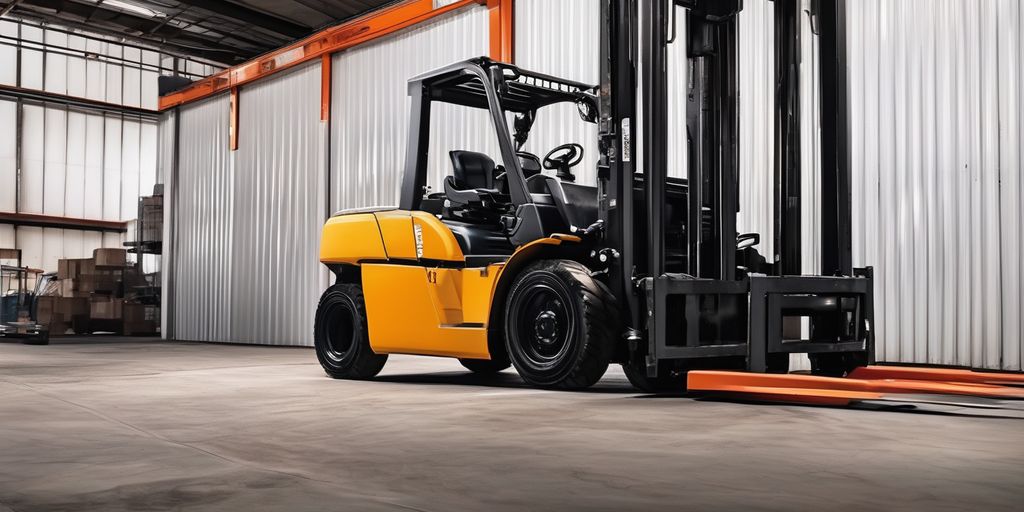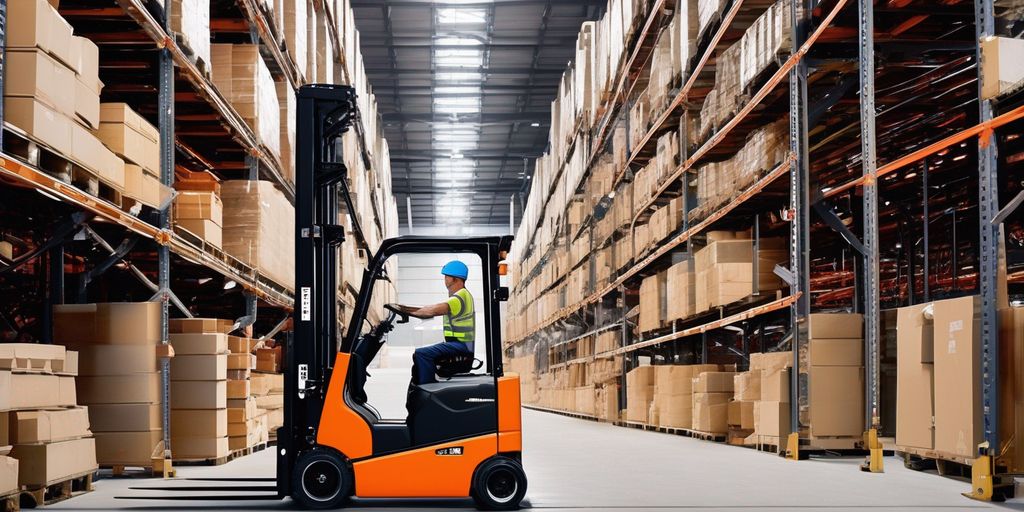Buying a used forklift can be a smart way to save money for your business. However, it’s important to know what you’re looking for to make the best choice. This guide will help you understand the different types of used forklifts, what to consider for your business needs, and how to evaluate the condition of a forklift before buying. We’ll also cover cost considerations, where to buy, legal and safety issues, and tips for making the final decision.
Key Takeaways
- Understand the different types of used forklifts, such as electric, diesel, and specialty models.
- Assess your business needs, including operational requirements, load capacity, and whether you need the forklift for indoor or outdoor use.
- Evaluate the condition of a used forklift by checking its maintenance history and hours of operation.
- Consider all costs, including the initial purchase price, maintenance, and repair costs.
- Know where to buy reliable used forklifts, such as dealerships, online marketplaces, and auctions.
Understanding Different Types of Used Forklifts
When buying a used forklift, it's important to know the different types available. Each type has its own benefits and is suited for different tasks. Choosing the right type can make your work easier and more efficient.
Electric Forklifts
Electric forklifts are powered by batteries and are great for indoor use. They are quiet and produce no emissions, making them ideal for warehouses and other indoor environments. They also have lower operating costs since they don't require fuel.
Diesel and LPG Forklifts
Diesel and LPG forklifts are more powerful and are better suited for outdoor use. They can handle heavier loads and are more durable in rough conditions. However, they produce emissions and can be noisier than electric forklifts.
Specialty Forklifts
Specialty forklifts are designed for specific tasks. For example, some are made for narrow aisles, while others are built to handle very heavy loads. Knowing your specific needs will help you choose the right specialty forklift.
When choosing a used forklift, understanding the different types can help you make an informed decision and improve your efficiency.
Assessing Your Business Needs
Operational Requirements
Before buying a used forklift, it's crucial to understand your operational needs. Think about the tasks you'll be doing and the environment where the forklift will be used. This will help you choose the right type and model.
Load Capacity and Lift Height
Knowing the average weight of the loads you plan to move is essential. Pick a forklift with a maximum weight limit that meets your needs. Also, consider the lift height required for your operations.
Indoor vs. Outdoor Use
Decide if the forklift will be used indoors, outdoors, or both. This will influence the type of tires and engine you need. For example, electric forklifts are often better for indoor use, while diesel and LPG forklifts are more suited for outdoor tasks.
Evaluating the Condition of a Used Forklift
When buying a used forklift, it's crucial to inspect its condition thoroughly. Check for any signs of wear and tear, rust, or damage. Inspect the mast, forks, tires, and other critical components. Ask for maintenance records to determine if the forklift has been well-maintained and serviced regularly. If possible, have a qualified mechanic inspect the forklift to ensure it's in good working condition.
Cost Considerations and Budgeting
When buying a used forklift, it's important to look beyond the initial price tag. Evaluate the total cost of ownership by considering various factors that can impact your budget over time.
Initial Purchase Price
The initial purchase price of a used forklift is often lower than that of a new one. However, it's crucial to weigh this against other costs that may arise. A slightly higher upfront cost might be a better investment if it means fewer repairs and better efficiency in the long run.
Maintenance and Repair Costs
Maintenance and repair costs can add up quickly. Regular maintenance is essential to keep the forklift running smoothly and to avoid costly breakdowns. Consider the forklift's maintenance history and any potential issues that could lead to expensive repairs.
Financing Options
There are various financing options available for purchasing a used forklift. You can opt for a loan, lease, or even rent-to-own plans. Each option has its pros and cons, so it's important to choose one that aligns with your financial situation and business needs.
Remember, buying a forklift is just the beginning. Ensure efficient operation and operator safety with proper maintenance and training.
By carefully considering these cost factors, you can make a more informed decision and find a used forklift that fits your budget and operational needs.
Where to Buy Reliable Used Forklifts
When it comes to purchasing a used forklift, knowing where to look is crucial. Finding a reliable seller can make all the difference in ensuring you get a machine that meets your needs and budget. Here are some of the best places to consider:
Dealerships
Dealerships are often the most trustworthy option. They usually offer warranties and have a reputation to uphold. This means they are more likely to sell forklifts that are in good working condition. Additionally, many dealerships provide maintenance services, which can be a significant advantage.
Online Marketplaces
Online marketplaces like IronPlanet.com, LiftsToday.com, and EquipmentTrader.com offer a wide range of options. However, buying online comes with its own set of challenges. You may not be able to inspect the forklift in person, and shipping costs can be high. Always check reviews and ratings to ensure the seller is reputable.
Auctions
Auctions can be a great place to find a deal, but they also come with risks. You might get a forklift at a lower price, but you won't have the opportunity to test it beforehand. Make sure to do your research and know the market value of the forklifts you're interested in.
Buying a used forklift doesn't have to be complicated. With the right research and a reliable seller, you can find a machine that fits your needs and budget.
Highlights
- Finding a reliable seller can make all the difference
- Dealerships are often the most trustworthy option
- Online marketplaces like IronPlanet.com, LiftsToday.com, and EquipmentTrader.com offer a wide range of options
- Auctions can be a great place to find a deal, but they also come with risks
Legal and Safety Considerations

Compliance with Regulations
When buying a used forklift, it's crucial to ensure it meets all legal requirements. OSHA requires that forklifts be inspected daily before use to identify and address any safety or operational issues. This helps ensure the forklift is in safe working condition. Make sure the forklift complies with local, state, and federal regulations to avoid any legal troubles.
Operator Training
Proper training for forklift operators is not just a recommendation but a legal requirement. Certified training programs are available and should be completed by all operators. This training helps in reducing accidents and ensures that the forklift is used correctly and safely.
Safety Features
When evaluating a used forklift, check for essential safety features. These may include:
- Fire extinguisher
- Emergency phone for communication
- Ready access to water
- Eyewash station
- Adequate ventilation to disperse flammable hydrogen gas
- Hazard signs such as no smoking
- Appropriate personal protective equipment like goggles, hard hats, and gloves
Safety is not just about the machine but also about the environment and the people operating it. Always consider the safety requirements of your people and your operation.
Making the Final Decision
Comparing Multiple Options
When you are close to making a choice, it's important to compare several forklifts. Look at their features, conditions, and prices. Make a list of pros and cons for each option. This will help you see which forklift fits your needs best.
Negotiating the Price
Once you have picked a forklift, it's time to talk about the price. Don't be afraid to negotiate. Sellers often expect it. You can ask for a lower price or for extra services like free delivery or a warranty.
Final Inspection and Test Drive
Before you buy, do a final check. Look over the forklift one more time to make sure everything is in good shape. Take it for a test drive to see how it handles. This is your last chance to spot any problems.
Remember, buying a forklift is a big decision. Take your time and make sure you are getting the best deal for your business.
Conclusion
Buying a used forklift can be a smart move for your business, saving you money while still getting the job done. By following the steps in this guide, you can make sure you pick the right forklift for your needs. Remember to check the forklift's history, inspect it carefully, and consider your specific requirements. With the right approach, a used forklift can be a valuable addition to your operations. Happy forklift hunting!
Frequently Asked Questions
What should I look for when buying a used forklift?
When buying a used forklift, check its overall condition, maintenance history, and hours of operation. Make sure it meets your business needs in terms of load capacity and lift height.
Is it better to buy an electric or diesel forklift?
It depends on your needs. Electric forklifts are great for indoor use and have lower emissions. Diesel forklifts are more powerful and better for outdoor use.
How can I tell if a used forklift is in good condition?
Inspect the forklift thoroughly, check for any signs of damage, and review its maintenance records. If possible, have a professional mechanic inspect it.
Where is the best place to buy a used forklift?
You can buy used forklifts from dealerships, online marketplaces, and auctions. Each option has its pros and cons, so choose the one that suits you best.
What are the hidden costs of owning a used forklift?
Hidden costs can include maintenance, repairs, and parts replacement. Make sure to factor these into your budget.
Do I need special training to operate a forklift?
Yes, operators need to be trained and certified to use a forklift safely. Make sure your employees have the necessary training.




Leave a comment
This site is protected by hCaptcha and the hCaptcha Privacy Policy and Terms of Service apply.